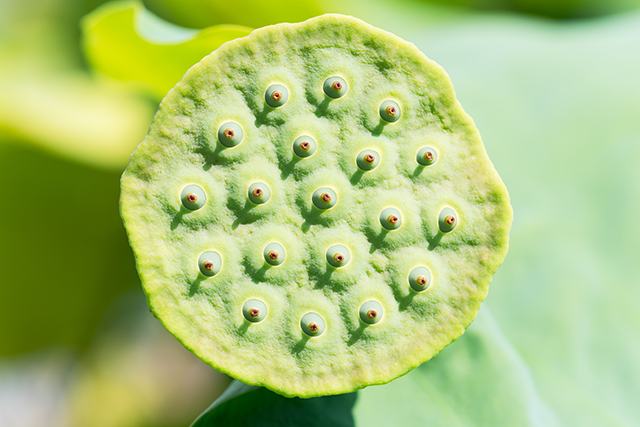Lotus seedpods found to protect the liver from inflammation
12/19/2019 / By Evangelyn Rodriguez

Nelumbro nucifera, more commonly known as the lotus plant, is a well-known source of food and medicine in Asia. While its roots are considered a vegetable in Japan, its petals are used to flavor dishes and to make herbal teas in China. The seeds of the lotus plant also serve different purposes. Not only are lotus seeds considered a nutritious snack, they are also highly valued in traditional Chinese medicine (TCM) for their ability to relieve digestive problems, reinforce the kidneys and nourish the blood.
In a recent study, which appeared in The American Journal of Chinese Medicine, researchers from Chung Shan Medical University in Taiwan examined the anti-inflammatory effects of lotus seedpod extract (LSE) on lipopolysaccharide (LPS)-induced hepatic inflammation. LPS, also called endotoxin, is a large molecule found on the outer membrane of gram-negative bacteria. LPS protects bacterial cells from their host’s defenses while simultaneously triggering the release of pro-inflammatory molecules. The researchers found that LSE can prevent this from happening and protect the liver from damage caused by inflammation.
Lotus seeds are rich in antioxidants that can confer protection against inflammation
LPS is known for its role in accelerating liver inflammation. While acute (short-term) inflammation is part of the body’s immune response, chronic (long-term) inflammation is linked to the development of serious conditions like heart disease, diabetes, Alzheimer’s disease and cancer. In a bid to find more effective ways to prevent these diseases, scientists continue to study medicinal plants that can inhibit inflammation. In particular, those with components that target LPS have attracted interest due to their potential therapeutic and clinical applications.

Extracts from the traditional Chinese herbal medicine lotus seeds have long been used to induce hemostasis and eliminate bruises. To examine its anti-inflammatory effects, the researchers treated LPS-stimulated human hepatoma (HepG2) cells with LSE and a compound purified from LSE called (-)-epigallocatechin (EGC). EGC is a plant metabolite and food component that is known for its antioxidant activity. It is found in almonds, beans and in black and green tea.
The researchers reported that both LSE and EGC dose-dependently inhibited the expression of pro-inflammatory cytokines and mediators without affecting cell viability. These included tumor necrosis factor (TNF)-a, interleukin (IL)-6, cyclooxygenase-2 (COX-2) and inducible nitric oxide synthase (iNOS). Molecular studies also revealed that the anti-LPS effect of EGC can be mediated via down-regulation of Toll-like receptor 4 (TLR4). TLR4 mediates both NF-kB and p38 signaling. NF-kB induces the expression of pro-inflammatory genes while the activation of p38 signaling contributes to cell cycle regulation, cell differentiation, programmed cell death (apoptosis) and inflammation.
Meanwhile, in vivo, the researchers found that LSE significantly ameliorated LPS-induced hepatic inflammation in LSE-treated mice. LSE also dose-dependently reduced serum levels of biochemical markers of liver damage and inhibited various processes, such as changes in hepatic lobular architecture, the secretion of pro-inflammatory mediators and the induction of antioxidant enzymes.
Based on these results, the researchers concluded that EGC-enriched LSE is an anti-inflammatory agent that can be used for the treatment of hepatic inflammation.
Health benefits of lotus seeds
The lotus plant is an aquatic plant that also goes by the name of water lily. It is native to Southeast Asia and is widely known for its ornamental flowers and edible seeds. Lotus seeds are rich in nutrients, such as fiber, protein, magnesium, zinc, niacin, riboflavin and pantothenic acid (vitamin B5). In TCM, they are used to improve the appetite, relieve palpitations and treat a variety of conditions, such as insomnia, irritability and diarrhea, among others.
According to several studies, lotus seeds offer plenty of health benefits, including:
- Lowering blood sugar levels
- Promoting sound sleep
- Strengthening the digestive system
- Preventing premature aging (boosts collagen production)
- Preventing gum disease
- Boosting energy levels
- Restoring lost appetite
- Treating urinary tract infections
- Maintaining healthy blood pressure
- Accelerating wound healing
Enjoy the anti-inflammatory properties of nutrient-rich lotus seeds by adding them to your regular diet. These seeds are rich in protein and fiber that can help curb your appetite and help you maintain a healthy weight.
Sources include:
Submit a correction >>
Tagged Under:
alternative medicine, anti-inflammatory, antioxidants, Chinese medicine, food cures, food is medicine, functional food, herbal medicine, inflammation, lotus seeds, medicinal plants, natural cures, natural medicine, phytonutrients, prevention, remedies, research, slender, TCM
This article may contain statements that reflect the opinion of the author





















